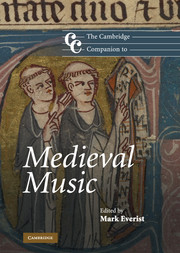6 - England
from Part II - Topography
Published online by Cambridge University Press: 28 September 2011
Summary
English musical life in the Middle Ages is often treated in standard textbook surveys as peripheral to that of France and Italy. This approach has several causes, but is rooted especially in musicology's preoccupation over the past 150 years of scholarship with medieval France. Noteworthy also in this negligence is the pairing of France and Italy late in the era in the emergence of polyphonic refrain songs as the chief new arte facts of secular high music culture in the 1300s, an attractive trend with no contemporary English-language counterpart. Musicology's paradigmatic narrative of English entrance onto the international stage, through its sacred polyphonic music, once began the story only in the second quarter of the fifteenth century.
What emerges, however, from more extended examination of medieval musical life is that modern political, geographic, linguistic and cultural boundaries are not relevant – for high culture, anyway – in the musical affairs of those parts of northwestern Europe we nowadays identify as France and England. And until this essentially homogeneous Anglo-French cultural sphere began to develop some marked regional differentiations in the thirteenth century, the elite and hermetic worlds both of courtly troubadour and trouvère song, and of the chant and polyphony of the church, spanned the English Channel effortlessly. The English were not latecomers to a game already being played elsewhere.
Further, a burst of research after the Second World War has provided specialists with a much different and expanded sense of the dimensions, vigour and creativity of medieval English musical life in the thirteenth and fourteenth centuries as it diverged from shared Anglo-French practice. This discovery has been mirrored in recent decades by the extraordinary amount of attention lavished on medieval English music in concerts and recordings by leading ensembles of the Early Music movement in Europe and North America.
- Type
- Chapter
- Information
- The Cambridge Companion to Medieval Music , pp. 105 - 120Publisher: Cambridge University PressPrint publication year: 2011
- 1
- Cited by



